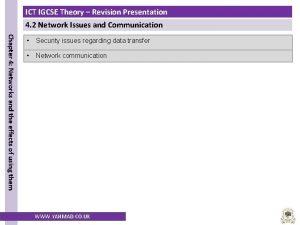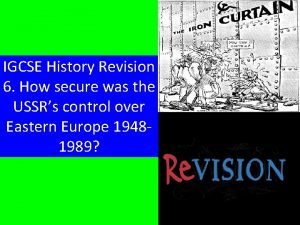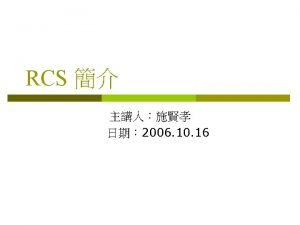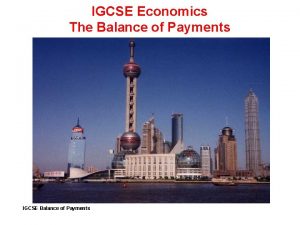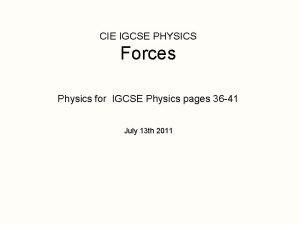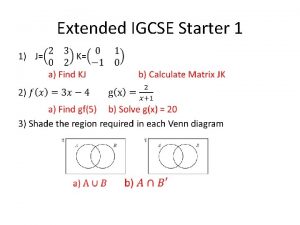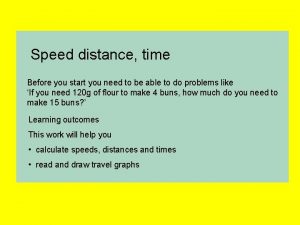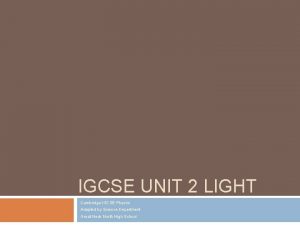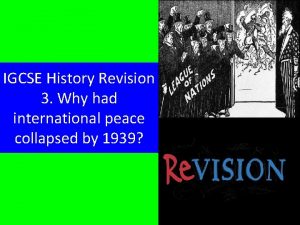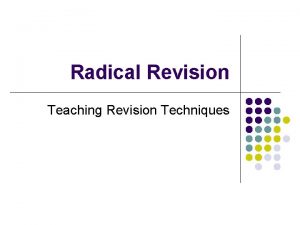IGCSE History Revision 6 How secure was the



























- Slides: 27

IGCSE History Revision 6. How secure was the USSR’s control over Eastern Europe 19481989?

Revision Tips 1) Be able to explain the causes of the uprisings in Hungary and Czechoslovakia. Remember though that after the war the USSR was suing these countries’ resources to rebuild the USSR. 2) Remember the Berlin Wall still allowed for access to West Berlin from West Germany, but did not allow free movement from the East or into East Berlin. 3) Be aware that Solidarity movement fails initially – it is not until Gorbachev comes to power and changes are made that they finally establish power.

Revision Tips 4) Despite Gorbachev’s reforms and realistic approach, he was still a Communist. He did though allow Eastern Europe to decide its own position in the Warsaw Pact. Make sure you give clear examples of which countries leave USSR control.

Opposition to Soviet control in Hungary & Czechoslovakia, USSR’s reaction?

Hungary • Uprising causes: – Poverty due to reparations, patriotism (hatred of AVH and censorship and Soviet presence – troops, shops, streets, schools), religion ban (cardinal mindzentsky out in jail), hated lack of freedom, encouraged by destalinization and expected US (Eisenhower) to help. Riots by students on 23 rd October: smashed statue of Stalin and attacked AVH (secret police). Imre Nagy asked Russia to withdraw from Warsaw Pact and declared neutrality for Hungary and freedom was achieved on 29 th October.

Hungary • Soviet reaction: 4 th November = rebellions crushed, Nagy killed, Janos Kador replaces Nagy. Results: – 200, 000 refugees fled to Austria – Repression and control by USSR in Hungary continued o 30, 000 Hungarians killed – West is horrified, polarization of cold war – US gains determination to contain communism.

Hungary • Player motives: Eisenhower did not think Hungary was worth war. – USSR vetoed investigations. – Britain and France were preoccupied with Suez Crisis. – Russia wanted to keep buffer zone of friendly states and could not have Nagy leave Warsaw Pact. – Nagy too capitalistic, hard liners within USSR and China pushed USSR to stop damaging communism by allowing Nagy to rule.

Czechoslovakia • Prague spring background: 1967, Czechoslovakia students and writers complain about lack of freedom and economic problems. – Novotny (Czech leader) received no help from Brezhnev (USSR leader). – On 5 th January 1968, Dubeck (reformer) took over as a leader of KSC (communist party). – Announced ‘Action Plan’ in April – more freedom of speech, ‘socialism with a human face’ – removed state controls over industry – new model of socialism 4 months = freedom in Czechoslovakia.

Czechoslovakia • Causes: driven by detente (improving relations with the west) and Romania’s break free from Warsaw Pact. – Czechs hated economy control and censorship. – They thought US would help.

Czechoslovakia • Soviet reaction: 3 rd August 1968 – declaration on Czechoslovakia to politically stabilize – Brezhnev under pressure from Ulbricht (hardline leader of East Germany) and Gomulka (hardline leader of Poland) to restrain reform of communism as they were worried that their people would demand capitalist freedoms. Brezhnev was criticized for being too liberal. * announced Brezhnev doctrine = would not allow any Eastern European country to reject communism, would not be allowed to abandon communism ‘even if it meant a third world war’.

Czechoslovakia • Soviet reaction: 3 rd August 1968 – declaration on Czechoslovakia to politically stabilize – On 20 th August 1968, 500, 000 Warsaw Pact troops invaded Czechoslovakia. – Dubeck arrested and replaced by Gustav Husak.

Czechoslovakia • Effects: return to communist control, 47 anti- communists were arrested and publishing companies were sacked. – In 1968, Albania resigned from Warsaw Pact because it thought USSR too liberal since Stalin died. – Unlike Czechoslovakia which was strategically and centrally placed and industrious, Brezhnev did not think it was important and made no effort to force Albania back into the Pact.

Why was the Berlin War built in 1961?

Berlin Wall • Growing tensions – fighting in Vietnam and Laos & Bay of Pigs invasion • Refugees: Brain drain in poor, strict East Germany led to economic loss. 2000 refugees per day moved to West Berlin. 3 million had moved to West Berlin. • Sabotage – West Berlin used for espionage • 13 th August 1961 = Berlin wall barbed wire all of border except for checkpoint Charlie 47, USSR propaganda success, hundreds killed trying to escape over next decades

Berlin Wall • It was a symbol of division portrayed differently by the East (who portrayed it as a protective shell) and West portrayed it as a prison wall)

Berlin Wall • Causes: – Worries about the arms race – nuclear testing was expensive, immoral, damaging to the environment, there was Campaign for Nuclear Disarmament (CND) in the West – Arms race limitation efforts due to economic strain (also due to rising oil prices)>SALT 1 (1972) and SALT 2 – End and shock of the Vietnam War: USA, USSR and China improved relations – Shock of Cuban Missile crisis and state of near- thermonuclear war

Berlin Wall • The Helsinki Agreement recognized Soviet control over Eastern Europe, concluded a trade agreement, and Russia promised to respect human rights. • Helsinki conference (August 1975), Nuclear Test Ban Treaty (1963) which led to Nuclear Non-proliferation Treaty (NPT, 1968), China joining UN were major achievements.

Berlin Wall • Limitations: – Non-Proliferation Treaty did not stop other countries developing nuclear weapons - Israel, China – SALT 1 ineffective as neither USA nor USSR complied. – SALT 2 had collapsed as singing was delayed and in June 1969 US did not ratify. – America supported Israel and Russia supported Egypt and Syria in Arab Israeli war. Division and proxy wars ritual continued.

Berlin Wall • Limitations: – The Helsinki Agreement achieved nothing, USSR continued to repress soviet sphere. – Table tennis and space meetings were just one-off propaganda stunts. – USSR (Brezhnev) still committed to anti-capitalist world revolution. – US improved relations with China specifically to drive a wedge between USSR and China and diplomatically isolate the Soviet Union.

Significance of ‘Solidarity’ in Poland for decline of Soviet influence in Eastern Europe

Solidarity • Background to Solidarity: – Regular protests in Poland usually about low wages or high food prices – In the late 1970’s the economy hit crisis & government could not solve the problems with propaganda. – 1976 – 1979 were terrible years for Polish industry, 1979 being the worst. – Small independent trade unions were set up and strikes broke out all over the country.

Solidarity • Background to Solidarity: – 1980 free trade union (Solidarity started by Lech Walesa) they wanted free trade unions & right to strike – Government agreed all 21 of their demands. – Membership of solidarity grew to 9. 4 mill. (Jan 1981) – Poland sinks into chaos. – December 1981 Brezhnev orders Red Army maneuvers on Polish border, introduces Marshall Law imprisons Lech Walesa and 10, 000 others & suspends solidarity.

Solidarity • Why Soviet/Polish government accepted Solidarity in 1980: – Union was strongest in most important industries – ship building and heavy industry – general strike would cripple economy. – Not seen as a threat to communist party. Only 5% members thought Solidarity plans> government – Lech Walesa tried to avoid provoking any disputes and portrayed and accepted as folk hero. – Solidarity spirit attracted West & was good propaganda

Solidarity • Why Soviet/Polish government clamped down by martial law on Solidarity in December 1981: – Increasing signs Solidarity acting as a political party – more of a threat. Talked of setting up new government without communist party. – Poland sinking into chaos – food shortages, rationing, rising unemployment, strikes out of control. Russia worried people would turn to Solidarity and not communism. – Solidarity was also sinking into chaos. Many different groups in the union, one group issued a statement that Poles were fighting “for your freedom and ours”. Groups threatened to pull Solidarity apart – Lech Walesa unable or unwilling to control them. Threat to Russia.

Responsibility of Gorbachev for the collapse of Soviet control of Eastern Europe?

Gorbachev • Role of Gorbachev: – Brezhnev ignored the needs for reforms in the 1980 s, internal corruption, USSR in crisis, locked in costly and unwinnable war in Afghanistan (‘Soviet Vietnam’), economy did not generate growth, chronic alcoholism and demotivation amongst workers draining economy, too much money spent on arms race, genuinely wanted to introduce economic reform and recovery. – Introduced ‘Perestroika’ (restructuring) open debate on economy, ‘Glasnost’ (openness) made it legal to buy and sell for profit – Abandoned Brezhnev doctrine – Encouraged nationalism in soviet sphere

Gorbachev • Role of other factors: – Arms race/costs of competing with USA, industrially, militarily and in proxy wars, especially Afghanistan, cause too much strain – Nationalism in satellite states and rise of Solidarity in Poland – There were also spiritual influences from the Pope and Islam and the attraction of western consumption due to reduction in censorship – Drastic fall in oil prices in the 1980 s which deprived the Soviet Union of resources that were necessary at a critical time.
 Igcse english revision
Igcse english revision Igcse ict theory
Igcse ict theory Ict igcse theory revision presentation
Ict igcse theory revision presentation Igcse ict chapter 4 notes
Igcse ict chapter 4 notes Igcse ict revision questions
Igcse ict revision questions Ict igcse practical revision presentation
Ict igcse practical revision presentation Ict igcse theory revision presentation
Ict igcse theory revision presentation Revision passive
Revision passive Ussr control over eastern europe igcse
Ussr control over eastern europe igcse History past papers edexcel
History past papers edexcel History gcse spec
History gcse spec Hát kết hợp bộ gõ cơ thể
Hát kết hợp bộ gõ cơ thể Lp html
Lp html Bổ thể
Bổ thể Tỉ lệ cơ thể trẻ em
Tỉ lệ cơ thể trẻ em Chó sói
Chó sói Glasgow thang điểm
Glasgow thang điểm Alleluia hat len nguoi oi
Alleluia hat len nguoi oi Môn thể thao bắt đầu bằng chữ đua
Môn thể thao bắt đầu bằng chữ đua Thế nào là hệ số cao nhất
Thế nào là hệ số cao nhất Các châu lục và đại dương trên thế giới
Các châu lục và đại dương trên thế giới Công thức tiính động năng
Công thức tiính động năng Trời xanh đây là của chúng ta thể thơ
Trời xanh đây là của chúng ta thể thơ Cách giải mật thư tọa độ
Cách giải mật thư tọa độ Làm thế nào để 102-1=99
Làm thế nào để 102-1=99 độ dài liên kết
độ dài liên kết Các châu lục và đại dương trên thế giới
Các châu lục và đại dương trên thế giới Thể thơ truyền thống
Thể thơ truyền thống


